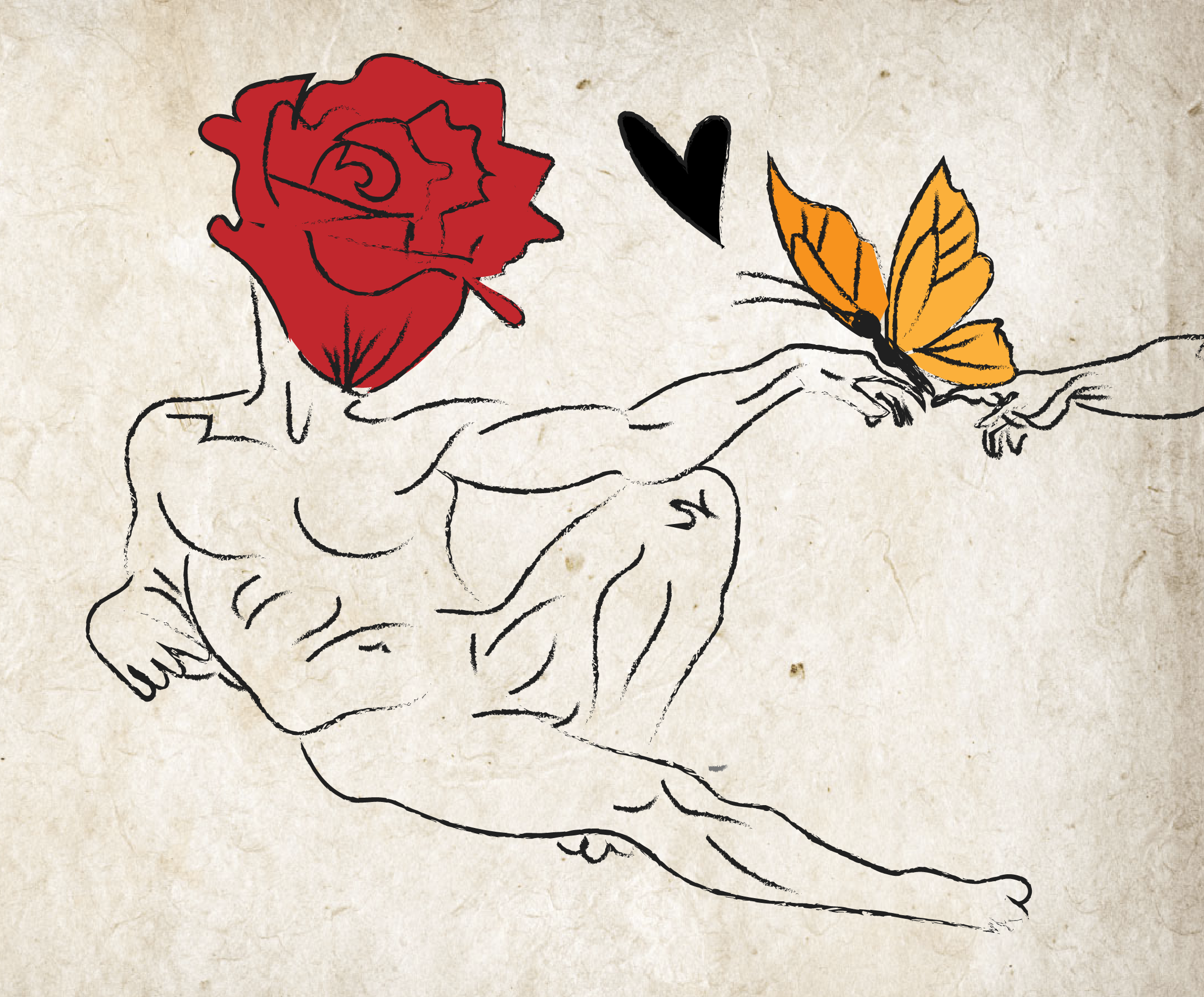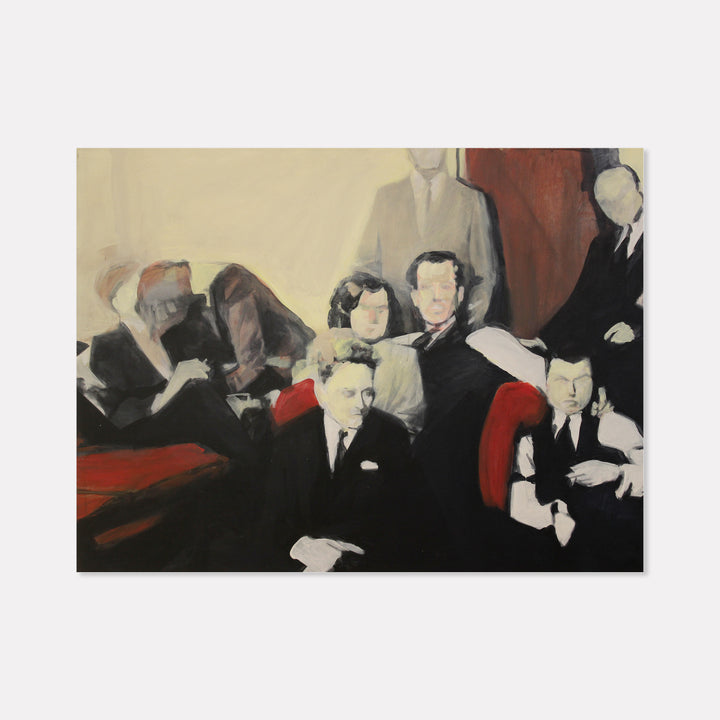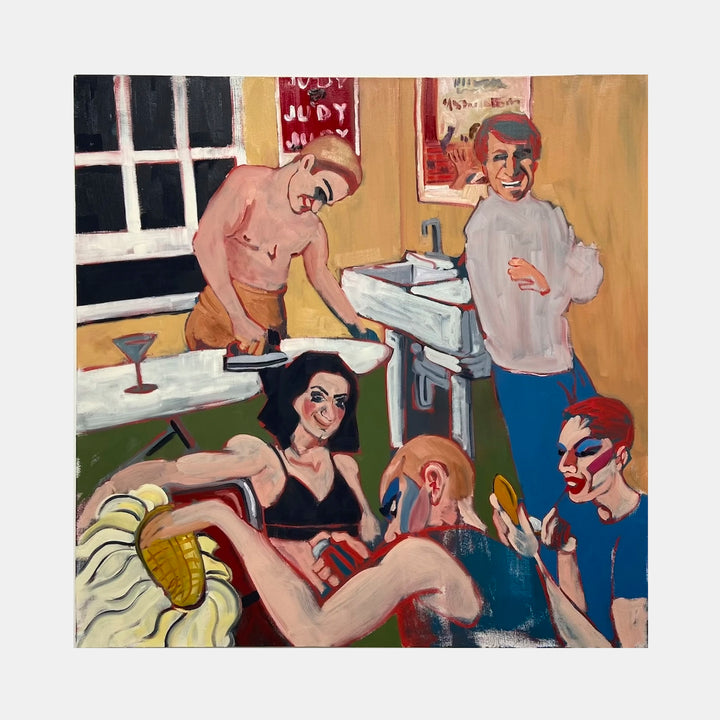No Products in the Cart

Let's explore vulnerability in all shades of human relationships!

“Bros before hoes,” “Hoes before bros” — we often feel the need to compare priorities between our friendships and romances. Of course, it is not only normal but healthy to set different expectations from different people in your life. But what exactly are those expectations for friends and lovers? It’s one of those things where the more you think about it, the less clear it seems.
One example: the notion that men and women can’t be friends. This illustrates that our strict division between friendship and relationships, or, between “like” and “love”, is tied to heteronormativity. Whenever I work at summer camp back in my home country, children I teach would see me spending a lot of time with someone of the opposite sex and immediately assume that we were boyfriend-girlfriends - what if we were both gay, you know…?
Another one is the phrase “Friend-zoned”, illustrated by the many TV show and rom-com narratives where unrequited love (usually from an introverted dude) towards a girl who sees him as just a friend gradually turns in to something more. It leaves us with the impression that friendship is somehow less valuable than a romantic relationship, a minor achievement so to speak. Even worse, friendship between opposite sexes is even seen as a step towards sex.
What is Platonic Intimacy?

Platonic is a somewhat misleading term rooting from classical Greek philosophy, describing “a type of love that is not sexual”.
In fact Plato himself never used the term, but in the book Symposium defines a “Ladder of Love” that leads to the kind of higher love that focuses not on the physical object of love, but turns one’s attention to contemplating virtues. So technically, “platonic” is a bit more specific than just not being sexual - there are connotations of elevating mind over body, intellectual over sexual, abstract over tangible. Which begs the question, what’s so wrong with being physical?
Spirituality was integral to the language that made the term Platonic what it is today. For centuries, it’s been used to attempt to put distance between emotional connection and sexuality, often elevating a specific understanding of love and putting down another. Symposium tends to put love in these dichotomies. Throughout are musings on soulmates, discussion of the morality between love towards male and female genders, and vulgar and divine eros (love), which represent the bottom and top of the ladder respectively.
Paul Anagnostopoulos, I Love You More Than You Love Me
Intimacy is meant both emotionally and physically.
Just observing the status quo, it is easier to find people who are emotionally intimate with “friends”, but we as a society have much more reservation towards physical intimacy, because we associate it with sex. Holding, hugging, cuddling, and even kissing - different cultures have different boundaries and scales on what is acceptable. But none of them are contingent on sex. When paired with the adjective “platonic”, intimacy urges us to consider, nay, simply revel in, the therapeutic effects of touch as is. We'll talk about non-Western examples in more detail in a separate article.
What does it look like?
Platonic intimacy doesn’t mean that you have to extend yourself to physical gestures towards everyone. In fact, respecting each other’s comfort level is all the more important - because what is appropriate and what’s not is not determined by your sex or gender but by your individual choices. You need to operate on communication, not assumption. I love to sleep in the same bed with my girlfriends, but should also respect the choice of not to do so.
What it does mean in general is that you try being more expressive with the people you call friends. We have developed a lot of rituals surrounding romance like anniversaries, dates, and even engagement and marriage, which in turn makes us more aware and proactive in this type of human relationship. Perhaps friendships should get this kind of attention, too - without having to lead everything with “no homo but -” (that’s so 2005 anyway).
What it also might entail is to transcend the dynamic of jealousy and competition by not putting an “exclusive” label on intimacy. Even with the popularization of polyamory, more people are comfortable with having plural friendship”s” than plural relationship”s”. Well, good, because no matter what kind of romance you choose, you can still practice sharing care with multiple people, which we apply to family and professional life as well. If you think about it, the 1:1 dynamic of traditional romance is the exception from the vast majority of group connections we make in community life.
Far-Reaching Implications

Platonic intimacy takes the condescension out of vulnerability.
Traditionally, friendship between cis-women have been seen as more emotional and intimate. This is, of course, not factually correct - but the stereotype still has consequences like restricting the type of expression assigned to people identifying as male and female, or even condescending female friendships as “gossipy” or “sobby”. By announcing that intimacy belongs to all kinds of relationships, we can also challenge this gender bias.
It also reiterates that just because someone shows you intimate gestures does not mean they want sex. Oversexualization blinds us from paying attention to the other party’s intentions and in turn projects our obsession with sex as a singular goal. Getting more used to intimacy in a non-sexual context will make it easier for people to see that everyone’s expectations are different.

For people experimenting with their sexual orientations, platonic intimacy establishes a level of respect regardless of whether they’ve “come to a decision” on where their sexual interests lie - because do we ever? You will stop interpreting gestures based on their orientation (“are they into girls or boys? I’m a girl - does that mean they eventually wanna get in my pants?”), or, the vaguely defined gender group they are supposed to behave based on, and instead see them as individuals. Some people are in fact suggesting to use the term queerplatonic intimacy.
To asexual people, platonic intimacy is all the more important because it recognizes non-sexual intimacy as an equally valid form of care.

Platonic intimacy in racial justice is to overcome the framework of competition and of the escapist mindset of climbing the ladder away from the community you were born in. We internalize racial oppression by adopting white, Eurocentric standards towards ourselves and to people immediately around us. It is a violence against your very self that will always be incomplete.
As we go through formal education and into the job market, we embody those standards in how we speak and gesture. We can consciously reevaluate why and how we feel become alienated from our family's cultures and make efforts to continue them. Accept the fact that you were not born from a neutral vaccum and get with the stickiness that ensues between you as an individual and the history of your community.

Artists exploring Platonic Intimacy
Lora Mathis (they/them/theirs)
is a photographer and illustrator who creates graphics often in the form of diagrams or quotes that encourage us to rethink colloquialisms. Their "platonic intimacy" and "radical softness" series work together like mantras to reaffirm that vulnerability is not only a part of life but empowering.

is an independent publisher founded by Be Oakley that "fosters an intersectional queer subjectivity". As their name implies, key to their philosophy is embracing imperfection - the Genderfail font was created from hand-written protest signs from the Christopher Street Gay Liberation March of 1974.

Collaborating with Lora Mathis to incorporate their Radical Softness slogan into the zine Radical Softness as A Boundless Form or Resistance, Genderfail highlights the political action-potential of emotional vulnerability against oppression.
The Le Sigh (now inactive)
was a platform for women and nonbinary artists. In collaboration with arts editor Hayley Cranberry, they organized a show titled Platonic Intimacy at Babycastles in 2017 featuring various media and interpretations of the concept by ten artists. According to Les Sigh, "The theme stemmed from a conversation about how the art word is oversaturated by narratives of sex and romantic intimacy, whereas platonic love is often overlooked, though just as important."

Johan Deckman (He/him/his)
is a psychotherapist and artist in Copenhagen who uses the format of self-help books to bring humor into everyday difficulties many people can sympathize with - "How to feel insecure but have an attitude like you know what it's all about", for example. By doing so, his book covers create a sense of belonging around viewers who feel heard by others on the other side of the book, instead of clinical language that often leaves people feeling singled out and alienated.

Shon Faye (She/her/hers)
is an English transgender writer, presenter, editor, journalist, artist and comedian.
Here is her bitterly hilarious article on Dazed on how to do single Valentine's without falling into the promise of an "alternative style" V-day.

Claudie Arseneault (She/her/hers)
is an asexual gray-aromantic writer from Quebec who founded a database for aromantic and asexual characters in fiction. When especially science fiction franchises are quick to resort to heteronormative hero-and-damsel-in-distress narratives, Claudie brings queer and asexual representation to the genre - combined with her studies in in biochemistry and immunology!
Clifford Price King (he/him/his)
is a portrait photographer who depicts black queer sexuality and masculinity.
Most of his works are explicitly non-platonic, but a few depict a more broad sense of intimacy.
"Through a display of vulnerability and intimacy, the black gay body gently exposed in King’s work remedies this trauma through the act of knowing and being known. In opening up and expanding into “the transhistorical space of gay life” through evoking the ghosts of Baldwin, Hughes, and Basquiat, the exposure and the laying of bodies together does not reproduce the act of being gazed upon but rather evokes a sense of familiarity. It is a call to not be seen as other, but as part of a resilient and expansive collective." (from website)
is an Instagram account featuring photos of closeness and intimacy between black people taken by black people.
Know of other creatives discussing platonic intimacy? Let us know in the comments and it'll help us learn!
Sources
https://greatist.com/connect/examples-of-platonic-intimacy
https://literelly.substack.com/p/platonic-intimacy-pushing-the-boulder








